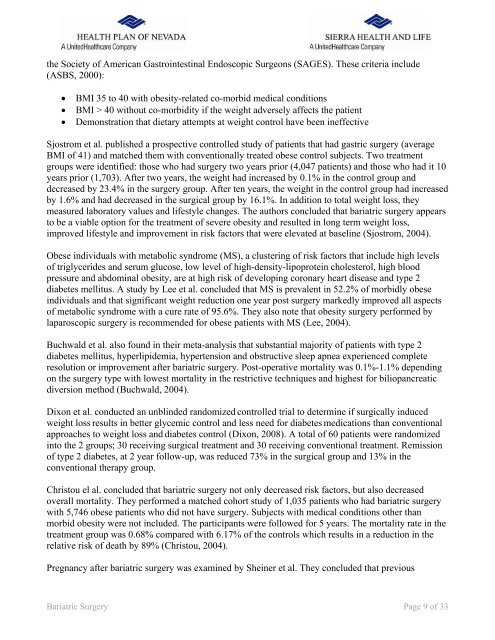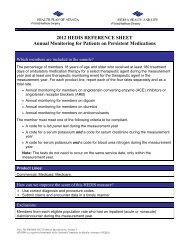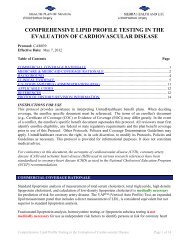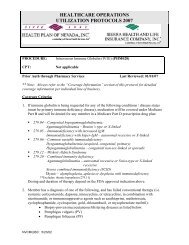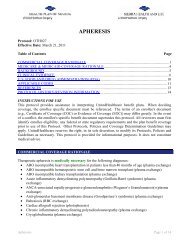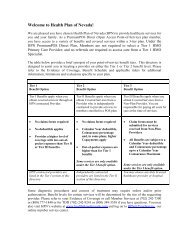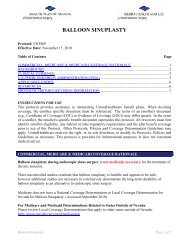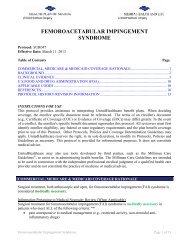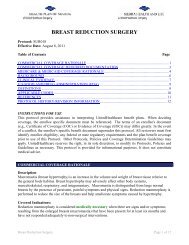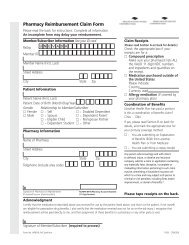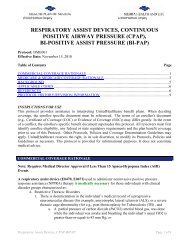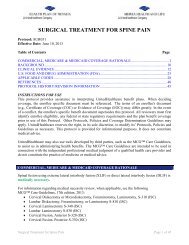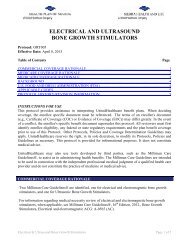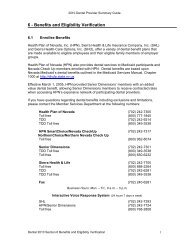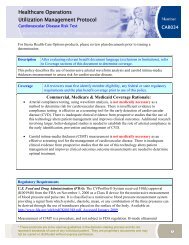BARIATRIC SURGERY - Health Plan of Nevada
BARIATRIC SURGERY - Health Plan of Nevada
BARIATRIC SURGERY - Health Plan of Nevada
Create successful ePaper yourself
Turn your PDF publications into a flip-book with our unique Google optimized e-Paper software.
the Society <strong>of</strong> American Gastrointestinal Endoscopic Surgeons (SAGES). These criteria include<br />
(ASBS, 2000):<br />
<br />
<br />
<br />
BMI 35 to 40 with obesity-related co-morbid medical conditions<br />
BMI > 40 without co-morbidity if the weight adversely affects the patient<br />
Demonstration that dietary attempts at weight control have been ineffective<br />
Sjostrom et al. published a prospective controlled study <strong>of</strong> patients that had gastric surgery (average<br />
BMI <strong>of</strong> 41) and matched them with conventionally treated obese control subjects. Two treatment<br />
groups were identified: those who had surgery two years prior (4,047 patients) and those who had it 10<br />
years prior (1,703). After two years, the weight had increased by 0.1% in the control group and<br />
decreased by 23.4% in the surgery group. After ten years, the weight in the control group had increased<br />
by 1.6% and had decreased in the surgical group by 16.1%. In addition to total weight loss, they<br />
measured laboratory values and lifestyle changes. The authors concluded that bariatric surgery appears<br />
to be a viable option for the treatment <strong>of</strong> severe obesity and resulted in long term weight loss,<br />
improved lifestyle and improvement in risk factors that were elevated at baseline (Sjostrom, 2004).<br />
Obese individuals with metabolic syndrome (MS), a clustering <strong>of</strong> risk factors that include high levels<br />
<strong>of</strong> triglycerides and serum glucose, low level <strong>of</strong> high-density-lipoprotein cholesterol, high blood<br />
pressure and abdominal obesity, are at high risk <strong>of</strong> developing coronary heart disease and type 2<br />
diabetes mellitus. A study by Lee et al. concluded that MS is prevalent in 52.2% <strong>of</strong> morbidly obese<br />
individuals and that significant weight reduction one year post surgery markedly improved all aspects<br />
<strong>of</strong> metabolic syndrome with a cure rate <strong>of</strong> 95.6%. They also note that obesity surgery performed by<br />
laparoscopic surgery is recommended for obese patients with MS (Lee, 2004).<br />
Buchwald et al. also found in their meta-analysis that substantial majority <strong>of</strong> patients with type 2<br />
diabetes mellitus, hyperlipidemia, hypertension and obstructive sleep apnea experienced complete<br />
resolution or improvement after bariatric surgery. Post-operative mortality was 0.1%-1.1% depending<br />
on the surgery type with lowest mortality in the restrictive techniques and highest for biliopancreatic<br />
diversion method (Buchwald, 2004).<br />
Dixon et al. conducted an unblinded randomized controlled trial to determine if surgically induced<br />
weight loss results in better glycemic control and less need for diabetes medications than conventional<br />
approaches to weight loss and diabetes control (Dixon, 2008). A total <strong>of</strong> 60 patients were randomized<br />
into the 2 groups; 30 receiving surgical treatment and 30 receiving conventional treatment. Remission<br />
<strong>of</strong> type 2 diabetes, at 2 year follow-up, was reduced 73% in the surgical group and 13% in the<br />
conventional therapy group.<br />
Christou el al. concluded that bariatric surgery not only decreased risk factors, but also decreased<br />
overall mortality. They performed a matched cohort study <strong>of</strong> 1,035 patients who had bariatric surgery<br />
with 5,746 obese patients who did not have surgery. Subjects with medical conditions other than<br />
morbid obesity were not included. The participants were followed for 5 years. The mortality rate in the<br />
treatment group was 0.68% compared with 6.17% <strong>of</strong> the controls which results in a reduction in the<br />
relative risk <strong>of</strong> death by 89% (Christou, 2004).<br />
Pregnancy after bariatric surgery was examined by Sheiner et al. They concluded that previous<br />
Bariatric Surgery Page 9 <strong>of</strong> 33


